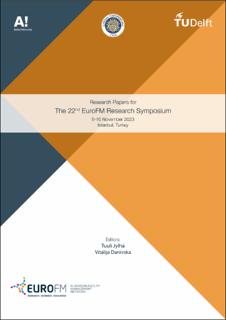| dc.contributor.author | Ghalandar Zehi Jalalabad, Toomaj | |
| dc.contributor.author | Hansen, Geir Karsten | |
| dc.contributor.author | Lindkvist, Carmel Margaret | |
| dc.date.accessioned | 2024-04-03T12:42:12Z | |
| dc.date.available | 2024-04-03T12:42:12Z | |
| dc.date.created | 2023-12-07T00:08:34Z | |
| dc.date.issued | 2023 | |
| dc.identifier.isbn | 9789090379456 | |
| dc.identifier.uri | https://hdl.handle.net/11250/3124685 | |
| dc.description.abstract | Background and aim - Currently, new opportunities and potentials arising from digitalisation and digital
twins do not stretch far enough into the future of the built environment, particularly for FM. Better
visioning of the future is required to prepare FM practice to adopt these opportunities and potentials
for innovation and to react to urgent sustainable requirements.
Methods / Methodology - This work is part of an ongoing research project on the delivery of digital twins
to facility management. Within this article, an exploratory approach is used to conduct a review of the
literature regarding digitalisation and the use of digital technologies such as BIM and Digital Twins across
the boundaries of epistemic knowledge. Furthermore, framework documents for digitalisation in the
UK and Norway have been reviewed to identify the key aspects by which technology integration is
geared towards the future. The main theoretical frameworks of this study are innovation and knowledge
management.
Results - Digitalisation and digital technologies’ integration represent a huge potential to bridge the gap
between early phases and FM. Digitalisation guided by frameworks can help shape the future of the
built environment, improving the dynamics of FM integration and practices within the building lifecycle.
However, the process is highly reliant on better communication and collaboration across the different
disciplinary boundaries, to reap the benefits of digital innovations within the sector.
Practical or social implications - Future making through the interlink of digitalisation and sustainability
can lead the industry to a future where technology is fit for purpose and FM data and sustainability
considerations are an integral part of the projects. This can also provide an outline for the identification
of possible gaps and drivers for innovation within the topic. | en_US |
| dc.language.iso | eng | en_US |
| dc.publisher | EuroFM | en_US |
| dc.rights | Navngivelse 4.0 Internasjonal | * |
| dc.rights.uri | http://creativecommons.org/licenses/by/4.0/deed.no | * |
| dc.title | Across the Boundaries of Epistemic Knowledge: Future Shaping Through Digitalisation Frameworks for FM | en_US |
| dc.title.alternative | Across the Boundaries of Epistemic Knowledge: Future Shaping Through Digitalisation Frameworks for FM | en_US |
| dc.type | Book | en_US |
| dc.description.version | publishedVersion | en_US |
| dc.identifier.doi | 10.5281/zenodo.10051131 | |
| dc.identifier.cristin | 2210071 | |
| dc.relation.project | Norges forskningsråd: 328730 | en_US |
| cristin.ispublished | true | |
| cristin.fulltext | original | |

